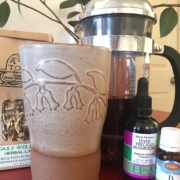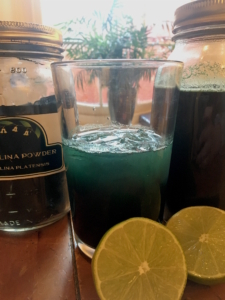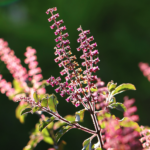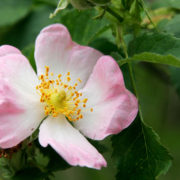Daily Protocol for Winter Wellness
With so many amazing healing plants to choose from, and a never-ending list of health crises, how do you know which herbs to turn to for help? In a holistic model of herbalism, there is no one-size-fits-all protocol for wellness, but there are tonic herbs that are generally safe and have a lot to offer a wide range of people in terms of nourishment, energy, and increased resistance to illness.
I want to share my current daily regimen as an example of how tonic herbs can be incorporated into daily life to promote overall energy, strength and vitality without focusing on a specific disease or condition. This is meant as preventative medicine. Please remember that some herbs in this protocol have specific contraindications and you will need to do your own research before deciding to use these formulas yourself.
Morning: Adrenal + Immune Support
 First thing every morning, I start with a cup of Daily Wellness Latte– an adaptogenic herbal coffee alternative. It contains ashwagandha, shatavari and fo-ti, all of which are adaptogens and balance the body’s response to stress by supporting the adrenal glands. Adaptogens tend to strengthen one’s energy reserves and balance the immune system (both of which are related to kindey qi in Traditional Chinese Medicine). You will notice that many adaptogens are also kidney tonics in TCM. These herbs are traditionally used for preventative and chronic care and are not recommended for acute conditions.
First thing every morning, I start with a cup of Daily Wellness Latte– an adaptogenic herbal coffee alternative. It contains ashwagandha, shatavari and fo-ti, all of which are adaptogens and balance the body’s response to stress by supporting the adrenal glands. Adaptogens tend to strengthen one’s energy reserves and balance the immune system (both of which are related to kindey qi in Traditional Chinese Medicine). You will notice that many adaptogens are also kidney tonics in TCM. These herbs are traditionally used for preventative and chronic care and are not recommended for acute conditions.
As a mother who has probably had 5 nights of uninterrupted sleep in the past 4 years, I know that I need to do whatever I can to nourish my kidney qi, which is depleted by lack of sleep, excessive worry, and other stressors. This tea also includes herbs like milk thistle seed, dandelion root and chicory to support the liver in its daily functions.
Sometimes I drink this on its own, sometimes I mix it with coffee, but I ALWAYS add the following:
- 4-6,000 IU of liquid Vitamin D. Vitamin D is a crucial for healthy immune function and has been shown to significantly reduce your chances of developing a respiratory infection (1). It is an important preventative supplement for anyone living in temperate regions and who spend most of their time indoors, especially for people of color.
- 2 droppersful of Seven Precious Mushrooms tincture, a formula by Herbalist & Alchemist composed of medicinal mushrooms. Mushrooms are a rich source of immune-strengthening polysaccharides, which have been well-studied in their effects on supporting the immune system, and have a long history of use in promoting longevity and resistance to disease. Like other adaptogens, mushrooms don’t simply stimulate immune function, they can also calm down a hyperactive immune response. They are immune amphoterics, meaning that they can work bidirectionally, depending on what your body needs.
So that’s my morning drink which covers energy, immune health, and chronic stress support. The mushroom tincture complements the bitter, coffee-like flavor of the tea. I enjoy this with coconut milk, but you could drink it black or add whatever you like to for creaminess.
Afternoon: Spirulina Lemonade
 Then, in the afternoon, I have been enjoying a spirulina lemonade as a nutrient-dense afternoon pick-me-up. I just wrote a post about spirulina, so please check that out to learn more about the health benefits of this blue-green algae.
Then, in the afternoon, I have been enjoying a spirulina lemonade as a nutrient-dense afternoon pick-me-up. I just wrote a post about spirulina, so please check that out to learn more about the health benefits of this blue-green algae.
The recipe is simple. It is:
-
-
-
-
- 1 heaping tsp spirulina powder
- juice from 1 lemon & 1 lime
- 1 TBSP honey
- 30 fl oz water
-
-
-
I mix all of this up in a quart jar, starting with the honey and citrus juice. You may need to add a splash of hot water to help dissolve the honey. Then I add the spirulina and stir. Once those components are well-blended, I fill up the jar the rest of the way with water, screw on the top and give it a shake.
I drink the entire quart over the course of a few hours directly from the jar. If you like, you can pour it over ice, but please do not heat it or you will destroy some of the vitamins & enzymes. Not only is this a great way to optimize your nutrition, it also helps you to stay hydrated in the winter months!
Evening- Intuitive Care
The evenings for me are the most challenging part of my day. From about 5:00-9:30 I don’t get much time for self-care and I have found that trying to adhere to a strict regimen feels stressful to me. So I keep it light by allowing myself to choose whatever feels most supportive for me.
This could be in the form of a calming nervine or a dose of CBD if I need help unwinding. It could be a subtle flower essence taken with a particular intention. It could be in the form of triphala tablets or bitters if I feel in need of digestive support, or simply going to bed early. A cup of golden milk is a lovely, grounding drink to have before bed and a delicious way to get turmeric into my day. Turmeric is warming and balancing to my cold constitution. If turmeric is too heating for you, gotu kola is a more cooling alternative.
This is the part where you get to tune in and listen to what your body is really wanting. Yes, it helps to have herbal knowledge in selecting the “right” herbs for you in that moment, but you do not have to be an expert to make these choices on your own. I recommend starting out by keeping a few simple herbs on hand and getting to know each one on its own before mixing them.
If I had to pick one herb to recommend as a generally safe tonic herb for the end of the day, it’d be…
Tulsi
 Tulsi (aka Holy Basil) is an Ayurvedic tonic herb with a calming & clarifying effect on the brain & nervous system. It is also an adaptogen, but it it has a lighter and more diffusive energetic than other adaptogens, making it acceptable for use in fevers and accute conditions. Tulsi is not recommended for women who are pregnant or nursing, but otherwise has no contraindications.
Tulsi (aka Holy Basil) is an Ayurvedic tonic herb with a calming & clarifying effect on the brain & nervous system. It is also an adaptogen, but it it has a lighter and more diffusive energetic than other adaptogens, making it acceptable for use in fevers and accute conditions. Tulsi is not recommended for women who are pregnant or nursing, but otherwise has no contraindications.
or Rose Petal. I can never choose just one.
Rose is another one of my alltime favorites. It’s probably the most soothing herb I have ever tried. You can read more about the benefits of rose petal here. Rose petals infused into almond milk makes a nourishing nightcap that is truly divine. Check Banyan Botanicals Recipe for Almond Rose Ojas Milk
Cautions
Not every herb is good for every person. Please note that the herbs mentioned above are generally not recommended for using during pregnancy. In addition, fo-ti root is not recommended for people with liver disease. Dandelion is not recommended if there is acute gallbladder inflammation or blockage of the bile ducts. Ashwagandha should be avoided by people with sensitivities to the solanaceae family. And mushrooms should be avoided by anyone with a mushroom allergy.
This article is for information purposes only & is not intended to treat, diagnose or prevent any disease

